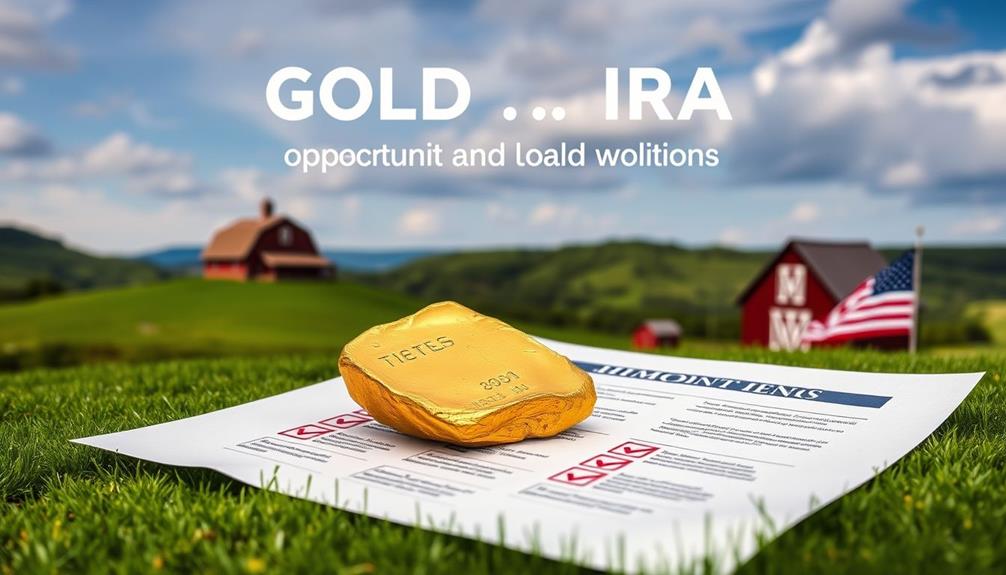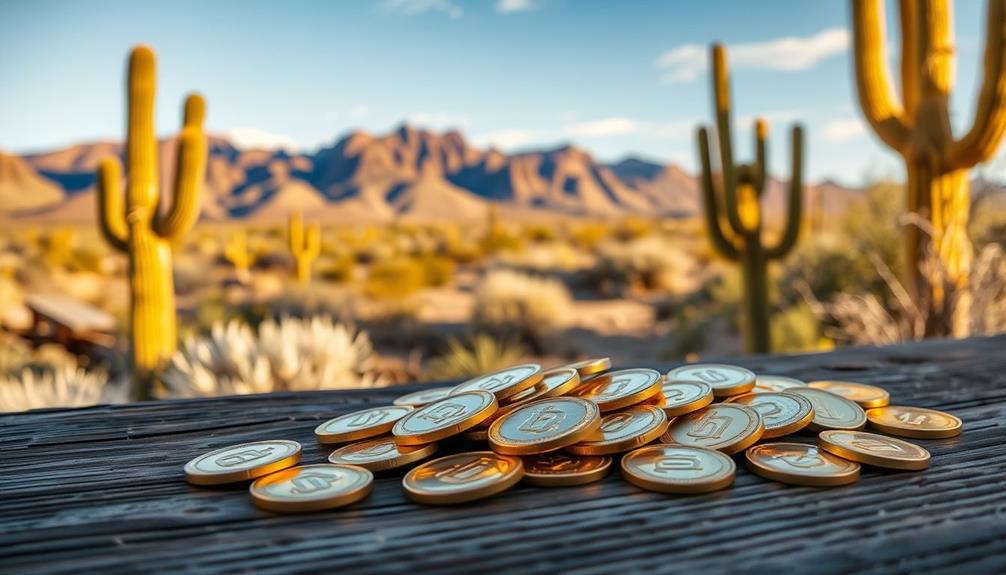Investing in a Gold IRA in Vermont requires compliance with both state and federal regulations to ensure your investments are secure. It is important to use gold that meets the purity standard of 99.5% and work with IRS-approved custodians to manage your account. Take advantage of local investment opportunities with reputable companies that offer tax advantages and help you build a diverse portfolio. Understanding the fees associated with setting up and maintaining your Gold IRA is essential for making informed decisions. Explore the local market to find resources and strategies tailored to your investment goals. There are many exciting opportunities to discover in this investment arena.
Key Takeaways
- Gold IRA regulations in Vermont comply with federal IRS guidelines, requiring gold to have a minimum purity of 99.5%.
- Investment advisers and gold IRA companies must be registered under the Vermont Securities Act for compliance.
- Custodial requirements mandate that gold be stored in IRS-approved depositories to ensure security and compliance.
- Gold IRAs offer tax-deferred growth, with Roth options allowing for tax-free withdrawals, enhancing investment flexibility.
- Understanding action fees and selecting transparent custodians are crucial for maximizing returns and informed decision-making.
Vermont's Regulatory Landscape

When considering gold IRA investments in Vermont, it's important to understand the state's regulatory landscape. Vermont aligns its gold IRA regulations with federal IRS guidelines, meaning only specific types of precious metals qualify, such as gold with a purity of 99.5%. This compliance guarantees that you're investing in assets that meet federal standards.
Under the Vermont Securities Act, investment advisers and gold IRA companies must register and adhere to strict regulations. This oversight helps you navigate the complexities of compliance, safeguarding your investments against potential penalties. Non-compliance with IRS regulations can lead to severe consequences, including losing your IRA status and incurring taxes.
In Vermont, custodial requirements mirror those elsewhere, necessitating that your precious metals be stored in IRS-approved depositories. This requirement is fundamental for maintaining your tax advantages.
Additionally, Vermont emphasizes transparency, compelling gold IRA companies to disclose fees and investment structures upfront. By understanding these regulations, you can make informed decisions about your gold IRA investments and protect yourself from unexpected costs.
Benefits of Gold IRA Investing

Investing in a Gold IRA offers several compelling benefits that can enhance your overall financial strategy. By allocating a portion of your retirement savings to precious metals, you can hedge against economic uncertainty and inflation. Historically, gold has provided an average annual return of 7.98% since 1971, making it a reliable long-term investment.
One of the key advantages of a Gold IRA is the potential for tax-deferred growth. Your gains grow without being taxed until you make withdrawals, which can greatly impact your retirement savings. Additionally, Roth Gold IRAs allow for tax-free withdrawals, providing even more flexibility.
Here's a quick overview of the benefits:
| Benefit | Description |
|---|---|
| Portfolio Diversification | Limits precious metals to 5%-10% of your portfolio. |
| Purity Standard | Gold must meet a 99.5% purity standard. |
| Tax Advantages | Tax-deferred growth until withdrawal. |
Self-Directed IRA Overview

A Self-Directed IRA (SDIRA) offers a unique opportunity for investors in Vermont to expand their retirement portfolios beyond traditional assets like stocks and bonds. With an SDIRA, you gain greater control over your investment choices, allowing you to include precious metals, real estate, and private companies in your strategy. This diversification can be vital for building a robust retirement portfolio.
You can choose from various account types when opening a Self-Directed IRA, including Traditional IRA, Roth IRA, or SEP IRA, depending on your financial goals and tax situation. Funding your SDIRA can be done through contributions, rollovers, or transfers from existing retirement accounts, but make sure you're aware of the specific rules and limits for each method.
It's essential to adhere to IRS regulations to maintain the tax-advantaged status of your SDIRA. Compliance is key, especially regarding prohibited transaction rules and investment restrictions.
Compliance Requirements for Gold IRAs

When investing in a Gold IRA, you need to be aware of IRS regulations that dictate which metals qualify and their required purity levels.
Understanding the investment strategies in precious metals can also guide you in making informed decisions.
Additionally, state compliance considerations can impact your investment choices, so it's essential to understand both federal and local rules.
Keeping these compliance requirements in mind helps you avoid costly penalties down the line.
IRS Regulations Overview
Understanding IRS regulations is essential for anyone looking to invest in a Gold IRA. To qualify, the gold you invest in must have a minimum purity of 99.5%. This requirement guarantees that your investment retains its value and meets IRS standards.
You'll also need to work with approved custodians who manage your Gold IRA, guaranteeing compliance with all IRS rules and facilitating transfers to precious metals dealers.
When it comes to storage, your gold must be held in IRS-approved depositories. If you don't adhere to these storage requirements, you risk penalties and potentially losing your IRA status.
Additionally, be aware of early withdrawal penalties; if you take distributions before age 59.5, you'll face a 10% penalty on top of regular income taxes.
For traditional Gold IRAs, required minimum distributions (RMDs) kick in at age 72, meaning you'll need to withdraw a certain amount from your account annually.
On the other hand, Roth Gold IRAs don't require RMDs since they're funded with after-tax dollars.
State Compliance Considerations
Complying with state regulations is just as important as adhering to IRS rules when investing in a Gold IRA in Vermont. Understanding Vermont regulations helps you guarantee that your investment in precious metals is both compliant and secure.
Additionally, working with reputable companies can enhance your investment experience and provide valuable insights into the process. Here are key compliance considerations to keep in mind:
- Minimum Purity Standard: Gold held in IRAs must meet a minimum purity standard of 99.5%, aligning with IRS guidelines.
- Approved Custodians: You must work with approved custodians who facilitate the purchase, storage, and transport of your gold IRAs, guaranteeing adherence to regulations.
- Eligible Coins and Bullion: Only specific coins and bullion accredited by recognized authorities or national mints qualify for inclusion in your Vermont Gold IRA.
- IRS-Approved Depositories: Storing your physical gold in IRS-approved depositories is essential to avoid penalties and maintain compliance.
Failure to comply with these standards can lead to severe tax implications, such as the potential loss of tax-advantaged status and penalties on distributions.
Investment Process for Gold IRAs

To successfully invest in a Gold IRA, you need to understand the specific regulations that govern these accounts. To successfully invest in a Gold IRA, you need to understand the specific regulations that govern these accounts. These accounts have strict rules regarding contribution limits, eligible metals, and storage requirements, which must be adhered to in order to maintain their tax-advantaged status. For those interested in gold IRA investing in Nevada, it’s important to research state-specific laws and partner with a reputable custodian to ensure compliance and security for your investments.
It's also important to evaluate the advantages of working with reputable companies like Noble Gold and their high customer service ratings.
You'll also want to carefully select the gold products that meet IRS requirements before moving forward with the investment process.
Understanding Gold IRA Regulations
Steering the investment process for Gold IRAs involves several key regulations that every investor should be aware of. First, you must comply with IRS regulations, which dictate that gold investments need a minimum purity of 99.5% and must be produced by accredited manufacturers or national government mints.
Additionally, involving a reputable custodian is essential for ensuring compliance with all necessary guidelines, as they can provide valuable insights on the benefits of Gold IRAs.
Here are some important points to take into account:
- Self-Directed IRA: You need to establish a self-directed IRA with a custodian who specializes in precious metals to facilitate the purchase and storage of eligible gold products.
- Funding: Fund your Gold IRA through transfers or rollovers from existing retirement accounts, ensuring deposits happen within 60 days to avoid tax penalties.
- Fees: Be mindful of various fees, including setup, storage, and transaction fees, as these can greatly impact your overall investment returns. Transparency in fees is critical when choosing a custodian.
- Required Minimum Distributions: Remember, traditional Gold IRAs require minimum distributions starting at age 72, while Roth Gold IRAs allow for continued tax-free growth without RMDs.
Understanding these regulations will help you navigate the Gold IRA investment landscape effectively.
Selecting Gold Investment Options
When you're selecting gold investment options for your Gold IRA, it's vital to verify that the gold meets IRS purity standards—specifically, a minimum of 99.5% for gold bars and coins. Your first step is to open a self-directed IRA, which allows you the flexibility to choose eligible gold products. Research and choose a reputable gold IRA custodian who specializes in precious metals to guarantee compliance with local regulations and IRS guidelines.
Consider the following aspects when making your selection:
| Factor | Details |
|---|---|
| IRS Purity Standards | 99.5% for gold bars and coins |
| Minimum Investments | Ranges from $1,000 to $50,000 |
| Eligible Gold Products | Gold coins, bars, and bullion |
| Rollover Options | Transfer from existing retirement accounts |
| Fee Structure | Includes setup, storage, and maintenance fees |
Understanding the fee structure is fundamental, as costs can vary greatly among providers. By being informed about these factors, you can make better decisions and optimize your investment in precious metals for your Gold IRA.
Completing the Investment Process
Completing the investment process for your Gold IRA in Vermont involves several straightforward steps after selecting your eligible gold products.
Start by verifying these products meet IRS purity standards, such as gold bars with a fineness of 99.5% or higher.
Here's what you need to do next:
- Submit an Investment Form: Provide your Gold IRA custodian with the details of the eligible gold products you want to acquire.
- Collaborate with Your Custodian: Work closely with a specialized Gold IRA custodian to verify your purchase complies with all IRS regulations regarding precious metals.
- Initiate the Transaction: Once you submit your form, the custodian will manage the transfer of funds and secure your purchased gold in an IRS-approved depository.
- Maintain Records: Keep thorough transaction records and investment documentation to adhere to IRS requirements and prepare for any potential audits.
Local Custodians and Resources

Finding the right local custodian for your Gold IRA is vital to guaranteeing a smooth investment process in Vermont. You'll want to partner with custodians that are IRS-approved, as they manage your IRA and guarantee compliance with federal regulations regarding precious metals.
Many local custodians offer services like facilitating the purchase of eligible investments and managing storage in approved depositories to meet these regulatory requirements.
When selecting a custodian, it's important to research and compare fees. Gold IRA fees can vary greatly, encompassing setup, storage, transaction, and annual maintenance charges. Understanding these costs will help you avoid surprises down the road.
Additionally, you can tap into local resources that provide educational materials outlining the regulations governing Gold IRAs. These resources can guide you on the types of eligible precious metals for investment, enhancing your understanding of the market.
Don't hesitate to reach out to specialized gold IRA companies in Vermont, as they can help you navigate the complexities of opening and funding your Gold IRA. This support guarantees you adhere to IRS rules on eligible investments while maximizing your investment opportunities.
Frequently Asked Questions
What Are the Requirements for a Gold Ira?
To establish a Gold IRA, you'll need a self-directed IRA with a qualified custodian. You'll also guarantee your gold meets purity standards, and store it in an approved depository to maintain tax advantages.
Are Gold IRAS a Good Investment?
You might think gold IRAs are a safe bet, but consider the fees, regulations, and penalties. They can be valuable, yet it's essential you assess your financial goals and diversify your portfolio wisely.
Where Can I Store My Gold Ira?
You can store your Gold IRA in IRS-approved depositories, like secure vaults or accredited third-party facilities. Make sure to check their compliance, storage fees, and insurance options for the best protection of your investment.
How Do You Cash in a Gold Ira?
Cashing in a Gold IRA's like opening a treasure chest. You can liquidate the gold or take an in-kind distribution. Just remember to check IRS standards and consider tax implications before diving in.
Conclusion
In Vermont, gold IRA investing opens up a treasure chest of opportunities, blending security with growth. Picture your future shining brighter, backed by the glimmer of gold. As you navigate local regulations and partner with trusted custodians, you're not just investing; you're crafting a legacy. Embrace the journey, knowing each step you take leads to a more secure retirement. So, plunge into it and let your financial dreams sparkle like gold beneath the Green Mountains.









